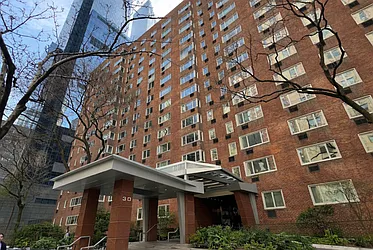
Most NYC co-ops, like Chelsea’s iconic London Terrace Towers, will look closely at a buyer’s debt to income ratio. (From a listing at 465 W. 23rd St.)
You’re on the hunt for an apartment and finally find the perfect co-op. You make an offer, and it’s accepted. Congratulations! The hard work is over now, right? Nope! It’s actually just the beginning of the buying process. You still have to prepare a robust financial package for the co-op board to review. And they could have more stringent financial requirements than a typical mortgage lender would with a condo. You might have to put up to 40% down, for example, and you’ll likely have to prove post-closing liquidity. One of the main details the board will want to examine is your debt to income ratio, or DTI. What’s that, you ask? Here’s everything you need to know.
What Does “Debt to Income Ratio” Mean?
You might have never heard the term “debt to income ratio” before entering the home-buying process. But understanding what it means can help you better understand your qualifications for purchasing a co-op.
In short, DTI is the percentage of your money that you pay toward your debt every month. “It takes your monthly debt and divides it by your gross income,” says personal finance expert Dori Zinn. To determine your DTI, she says, “add up all your debts, like your car payment, student loan payment, credit cards, and rent, then divide by your monthly gross income. That figure is your debt to income ratio.”
Co-op boards also take into consideration the mortgage and maintenance payments you would have after your purchase, and any other mortgages you currently have. Real estate-related expenses, such as future property taxes and maintenance fees, can also be included in the debt, while passive income, such as investments or stock dividends, are considered part of your gross income.
“A low DTI means you don’t have a problem paying your debt every month,” explains Zinn. “In the event of a financial emergency, you’d be able to cover it without sacrificing your other financial obligations. Home-loan lenders prefer low DTIs because it means you’re less likely to miss a home payment in case something comes up.”
Manhattan Homes Under $1M on StreetEasy Article continues below
Why Do NYC Co-op Boards Look at Debt to Income Ratio?
Co-op boards look at your entire financial portfolio to determine whether you’ll be a reliable tenant. Your DTI is just one of many factors, but it’s an important one.

This landmarked co-op in Brooklyn Heights was built in 1907. (From a listing at 155 Henry St.)
“Co-op boards look at debt to income ratio as a way of measuring your ability to manage your monthly payments,” says Becki Danchik of Warburg Realty. “It also assures them that you will have enough money to cover any assessments that could come up in the building.”
Warburg’s Mihal Gartenberg adds, “Boards look at prospective buyers’ debt to income ratio because it helps them understand whether the buyers can meet their financial obligations. This is important because if any neighbor drops their responsibility, the building will need to pick up the slack.”
Where Can I Find a Co-op’s Debt to Income Requirements?
Unfortunately, co-ops do not publish their debt to income requirements. And the information will only be found in the co-op board minutes if there has been a recent change in the requirements. But you can rely on your real estate agent for some insight. “Discuss this with your real estate salesperson,” says Warburg’s Parisa M. Afkhami. “He or she should be experienced and fully educated on the coop board’s financial procedures and guidelines.”
So is there an average or ideal DTI that buyers should aim for? Yes, says Danchik: The majority of NYC co-ops look for a debt to income ratio of between 25% and 30%. A DTI of 28% or less is more acceptable, she says, and the strictest co-ops will require one closer to 20%. “The lowest I have seen is 18%,” she says.
Brooklyn Homes Under $1M on StreetEasy Article continues below
Is My Debt to Income Ratio Negotiable?
The simple answer to this question is no. A debt to income ratio isn’t negotiable, since it’s a mathematical calculation. But there are ways you can work to change it.
“You can’t negotiate that figure with lenders, but if you want to lower your DTI, you can pay off more of your debt or increase your income,” says Zinn. “For instance, if possible, pay off your car or student loans before applying for a mortgage. You can also try requesting a raise or starting a side-hustle to increase your income.” You may also want to consider putting down more cash up front to lower your monthly mortgage payments. That would reduce your DTI as well.
Also, remember that boards look at a buyer’s overall financial health, not just their DTI. “This means that if your debt to income is higher than 25%, it’s a good idea to express in the board package if you expect that number to go down over time,” says Gartenberg. “If it won’t, can you balance your higher DTI with a healthier financial picture of post-closing liquidity, for example? Show the board that while your income level may not meet the requirement they’re looking for, your liquidity surpasses their expectations and makes up the balance.”
—
Whether you’re looking to rent or to buy, find your next NYC apartment on StreetEasy.

































